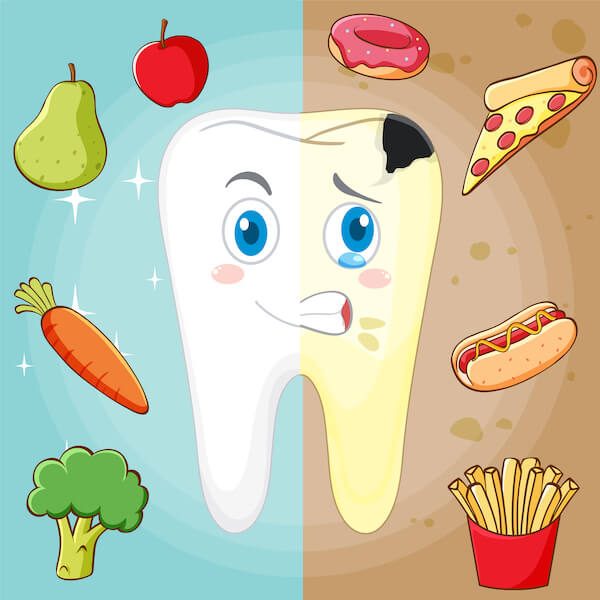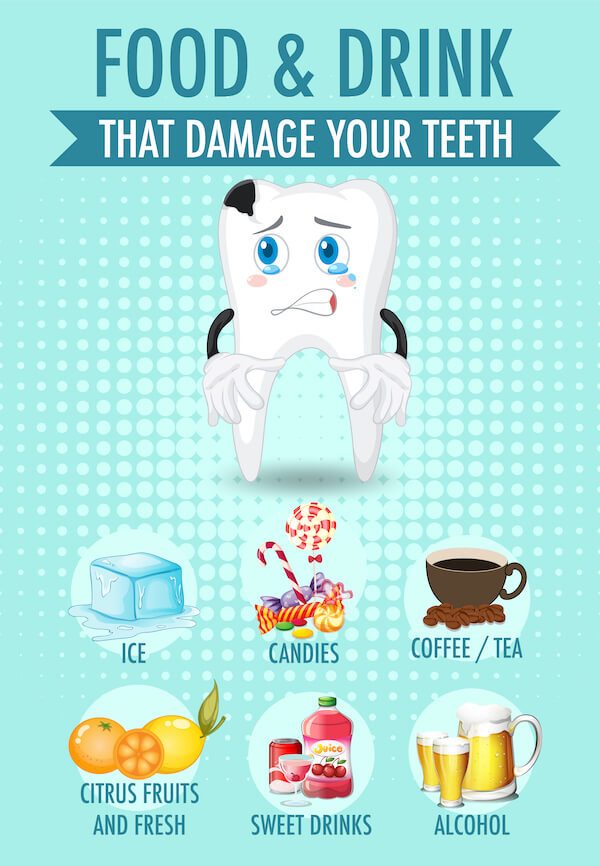Ask the Dentist: What foods are good and bad for your teeth and gums?

Did you know that your diet has a profound impact on your overall health, and your dental health is no exception.
If you know anything about plants growing in a garden – you’d understand that they ALWAYS need water, soil and sunshine to grow and thrive.
Our bodies are no different – we need the right vitamins and nutrients for the body and teeth and gums to grow and thrive. That’s why the foods and drinks you consume play a critical role in the health of your teeth and gums.
If you’re looking to maintain a healthy smile and keep your teeth for life, understanding how diet influences oral health is essential. This guide will explore the best and worst foods for your teeth and offer practical tips for maintaining optimal oral hygiene.
The Connection Between Diet and Dental Health
Your mouth is the gateway to your body. What you eat not only affects your energy levels and overall wellness but also has a direct impact on your teeth and gums.
Certain foods can strengthen your teeth and gums, while others may lead to a higher risk of tooth decay, discoloration, or gum disease.
When you consume sugar and starch, the bacteria in your mouth feed on these carbohydrates, producing acids as a byproduct. These acids from the bacteria attack your tooth structure, leading to cavities and tooth decay.
Conversely, a diet rich in essential nutrients can help fortify your teeth, promote healthy gums, and reduce the risk of dental issues.
Foods that are inflammatory are more likely to also weaken your gums and bones making them more susceptible to bone loss and gum disease.
Vitamins and Nutrients that are important for Healthy Teeth
Vitamin C supports collagen production, which helps maintain strong gums and prevents gum disease. Maintaining adequate vitamin C levels can improve gum health and reduce inflammation significantly.
Vitamin D plays a role in calcium absorption and immune health, which is crucial for strong teeth and bones. Consuming enough vitamin D is linked to a 30% decrease in lowering gum disease risk.
Calcium is a key component of tooth enamel, providing strength and resistance to decay. Calcium plays a crucial role in maintaining tooth structure, directly influencing overall dental strength and health.
Magnesium is essential for calcium absorption which is important for bone health, promoting optimal dental health and preventing cavities. Magnesium also helps with regulating blood sugar and blood pressure which is important for healthy gums and bone structure, supporting overall oral health.
Iron supports oxygen delivery to tissues, including the gums, promoting healthy blood flow. There is a 25% increase in oral health in those who incorporate iron-rich foods into their diet regularly.
Vitamin K2 plays a role in bone mineralization, which is essential for strong tooth roots and overall dental health. 60% of individuals consuming vitamin K2 experience improved oral health, including stronger teeth and healthier gums.
Omega 3 fatty acids help reduce inflammation, which can contribute to gum disease and other dental problems. 1gram of omega-3 fatty acids daily can significantly enhance gum health and reduce the risk of periodontal disease..
Foods to Embrace for Healthy Teeth
#1. Dairy Products
Dairy products like milk, cheese, and yogurt are rich in calcium, phosphorus, and vitamin D. These nutrients are essential for maintaining strong teeth and bones.
Vitamin D, in particular, aids in calcium absorption, enhancing its benefits for your enamel and jawbone. Cheese also stimulates saliva production, helping to wash away food particles and neutralize harmful acids.
#2. Leafy Greens
Leafy greens like spinach, kale, and broccoli are loaded with vitamins and minerals, including calcium, folic acid, and vitamin C. Calcium strengthens enamel, while vitamin C supports gum health by reducing inflammation and promoting collagen production.
#3. Crunchy Fruits and Vegetables
Crunchy fruits and vegetables such as apples, carrots, and celery are not only rich in vitamins but also act as natural toothbrushes. They are high in fiber and vitamin A, which is vital for maintaining healthy mucous membranes and supporting saliva production, a critical defense against bacteria.
#4. Nuts and Seeds
Nuts and seeds are excellent sources of calcium, phosphorus, and omega-3 fatty acids. Almonds, for instance, are low in sugar and high in protein and calcium, making them a tooth-friendly snack. Omega-3 fatty acids, found in flaxseeds and walnuts, have anti-inflammatory properties that can benefit gum health.
#5. Green and Black Teas
Green and black teas contain polyphenols, which help reduce the growth of harmful bacteria in the mouth. These teas also provide fluoride, which strengthens enamel and prevents cavities. Additionally, they are rich in antioxidants that support overall oral health.
#6. Fatty Fish
Fatty fish such as salmon, mackerel, and sardines are rich in vitamin D and omega-3 fatty acids. Vitamin D enhances calcium absorption, while omega-3s reduce inflammation and support healthy gums.
#7. Water
Water is indispensable for oral health. Drinking fluoridated water helps strengthen teeth and wash away food debris. Staying hydrated also promotes saliva production, which is your mouth’s natural defense mechanism against cavities and gum disease.

Foods and Drinks to Avoid
#1. Sugary Snacks and Drinks
Candy, cakes, and soft drinks are some of the worst offenders when it comes to dental health. The high sugar content feeds harmful bacteria, leading to the production of enamel-eroding acids. Sticky candies, in particular, are problematic as they cling to teeth for extended periods.
#2. Starchy Foods
Foods like white bread, chips, and pasta break down into simple sugars, which can contribute to plaque buildup. These starches often get trapped in hard-to-reach areas, increasing the risk of cavities.
#3. Acidic Foods and Beverages
Citrus fruits, tomatoes, and vinegar-based dressings are acidic and can erode enamel over time. Similarly, drinks like coffee, wine, and energy drinks are highly acidic and may cause discoloration and sensitivity.
#4. Alcohol
Excessive alcohol consumption can dry out your mouth by reducing saliva production, which increases the risk of tooth decay and gum disease. Alcoholic beverages often contain high levels of sugar and acidity, compounding the problem.
#5. Sticky and Chewy Foods
Sticky and chewy foods like dried fruits, toffees, and caramel can adhere to your teeth, providing a prolonged food source for bacteria. These foods are particularly harmful if not removed promptly.

Tips for a Dental-Friendly Diet
- Practice Moderation: While it’s okay to indulge occasionally, limit your intake of sugary and acidic foods and drinks.
- Rinse After Eating: Rinse your mouth with water after consuming sugary or acidic foods to reduce their impact on your teeth.
- Chew Sugar-Free Gum: Chewing sugar-free gum stimulates saliva production, which helps wash away food particles and neutralize acids.
- Opt for Whole Foods: Choose whole, unprocessed foods over packaged snacks. Whole foods often have fewer added sugars and are less likely to stick to your teeth.
- Incorporate Fluoride: Use fluoridated toothpaste and drink fluoridated water to strengthen enamel and prevent cavities.
- Snack Wisely: Choose tooth-friendly snacks like cheese, nuts, or raw vegetables instead of sugary or starchy options.
- Boost Nutrient Intake: Incorporate foods rich in calcium, vitamin D, vitamin C, and omega-3 fatty acids into your diet to support oral health.
- Visit Your Dentist Regularly: Regular dental check-ups are essential for catching potential issues early and maintaining optimal oral health. If you’re in Sydney, book an appointment with your local dental clinic for personalized advice.
Conclusion
Your diet has a direct impact on your dental health. By embracing tooth-friendly foods like dairy, leafy greens, crunchy vegetables, and fatty fish, and avoiding sugary, acidic, and sticky foods, you can maintain a healthy smile for years to come.
For tailored advice and professional care, visit your trusted local dental clinic. Prioritize your oral health—your smile is worth it!
If you need a dental appointment or want an honest trusted opinion on your teeth, please contact My Local Dentists to have a consultation and experience the peace of mind that comes with knowing your smile is in good hands.
Our qualified dental professionals can provide you with the insights and information you need to make an informed decision about how best to manage and look after your teeth.
